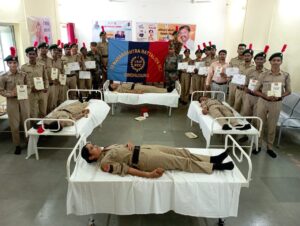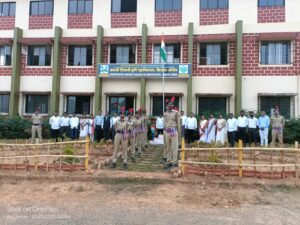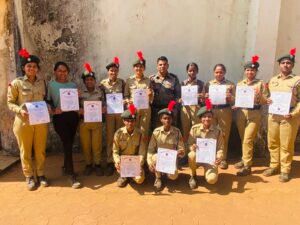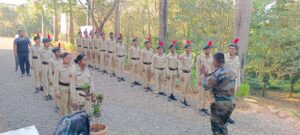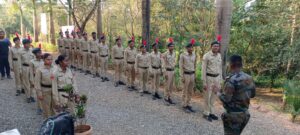NCC (National Cadet corps)
Brig. Sudhir Sawant started NCC unit at Chhatrapati Shivaji college of Agriculture kirlos on 03 may 2019.ChhatrapatiShivaji college of Agriculture kirlos oros has NCC wing for Boys & Girls under 58 Maharashtra battalion NCC Sindhudurg. Total strength of NCC cadets are 107. Adv. Vivek Rane is appointed as NCC officer at CSCAKO under 58 Maharashtra battalion NCC Sindhudurg.
AIM OF NCC
The ‘Aims’ of the NCC laid out in 1988 have stood the test of time and continue to meet the requirements expected of it in the current socio–economic scenario of the country. The NCC aims at developing character, comradeship, discipline, a secular outlook, the spirit of adventure and ideals of selfless service amongst young citizens. Further, it aims at creating a pool of organized, trained and motivated youth with leadership qualities in all walks of life, who will serve the Nation regardless of which career they choose. Needless to say, the NCC also provides an environment conducive to motivating young Indians to join the armed forces.
MOTTO of NCC
The need for having motto for the Corps was discussed in the 11th Central Advisory Committee (CAC) meeting held on 11 Aug 1978. The mottos suggested were “Duty and Discipline”; “Duty, Unity and Discipline”; “Duty and Unity”; “Unity and Discipline”. The final decision for selection of “Unity and Discipline” as motto for the NCC was taken in the 12th CAC meeting held on 12 Oct 1980.
CORE VALUES
The NCC is a responsive, learning and continuously evolving organization. Its activity is guided by certain Core Values that we end eavour to in still among all ranks of the NCC. These include the following:
- A sense of patriotic commitment to encourage cadets to contribute to national development.
- Respect for diversities in religion, language, culture, ethnicity, life style and habitat to instill a sense of National unity and social cohesion.
- Abiding commitment to learn and adhere to the norms and values enshrined in the Indian Constitution.
- Understanding the value of a just and impartial exercise of authority.
- Ability to participate in community development and other social programme.
- A healthy life style free of substance abuse and other unhealthy practices.
- Sensitivity to the needs of poor and socially disadvantaged fellow citizens.
- Inculcating habits of restraint and self-awareness.
- Understanding the values of honesty, truthfulness, self-sacrifice, perseverance and hard work.
- Respect for knowledge, wisdom and the power of ideas.
